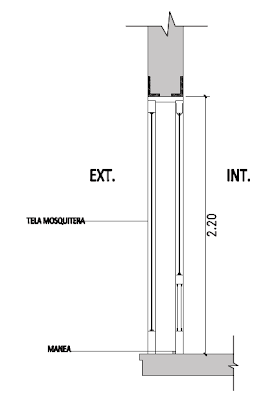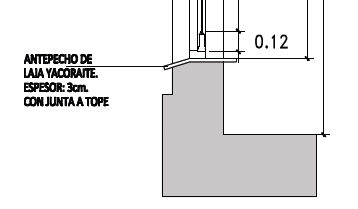Our door & window questions were about frames, glass, screens, weatherstripping, thresholds, windowsills, lintels & hardware.
algorrobo: an Argentine hardwood
antepecho: windowsill
bastidor: door rail/window sash
cedro: cedar
dintel: lintel
DVH, aka doble vidriádo hermético: double-pane glass
hoja: sash piece, window pane
laja: flagstone
madera: wood
marco: door/window frame
quebracho: an Argentine hardwood
sello: weatherstripping
tela mosquitera: screen
umbral: threshold
vidrio: glass
bastidores (rails/sashes)
Madera (wood) or PVC? Possible woods include cedro (cedar) (medium hard) & algarrobo (very hard). PVC is what we call vinyl in the US.
Wood suffers from swelling & shrinking in the Cafayate climate. If bastidores (door rails/window sashes) are not sufficiently thick & wide, the bastidores will warp. Individual rails/sashes should be 10 cm (4") wide, which reduces vidrio (glass) size.
For example, we wanted our doors to have a single hoja (pane) of glass from bottom to top rail, but our builder advised against. We went with a smaller glass pane at the bottom, another rail, & a larger pane at the top.
PVC (aka vinyl) is stable in the Cafayate environment. Most installations we've seen use brown/wood-colored PVC. The bastidores (frames) are smaller, which allows the glass to be larger. PVC looks similar to but not quite like wood.
We chose wood, but if we had the decision to make again, we might go with PVC.
I discuss door & window hardware choices in this previous post.
vidrio (glass)
From the start, for insulation against heat & cold as well as to keep the polvo (dust) out, we specified what we call in the US double-paned or double-glazed glass.
Unfortunately we didn't know the Argentine term: DVH, doble vidriádo hermético. Fortunately, we sorted this out before building began. Cristalizando, a Salta company, is providing the DVH:
The ventana (window) over our stairway will be a custom stained-glass work created by Nadia Khan, an artist who currently lives in the town of Vaqueros, slightly north of Salta.
Some of you may remember two pieces of her work that used to hang in Charlie & April Selman's Colorado Restaurant.
telas mosquiteras (screens)
Insectos (insects), particularly moscas (flies) & mosquitos (mosquitoes), are annoying in La Estancia for some of the year, particularly a rainy year like this past one. Argentines may or may not have telas (screens) on their windows & doors, but we fussy Americans need them.
The screening is metal, not the fiberglass we've become used to. It's also silver colored, which is very visible & reflective in bright sunlight. We're told that the screening can be painted black & thereby becomes nearly invisible. We've not seen a sample of this.
sello (weather stripping)
The insects & dust make weatherstripping on doors very important. We've seen various types of inadequate weatherstripping, but we've not seen good weatherstripping, although I suspect it may be integral & therefore another advantage to PVC doors & windows.
We're taking dust control one step further with a 2-centimeter-high manea (molding) nailed to all four interior sides of the door frame. You can see the manea strip at floor level in this drawing:
umbrales (thresholds)
Stone, wood, tile, none? We've chosen laja yacoraite umbrales for exterior doors
& wood thresholds for some interior doors. Other interior doors, such as the door that leads from the master bedroom to the walk-in closet has the same San Carlos tile running from the bedroom under the door & on into the closet.
algorrobo: an Argentine hardwood
antepecho: windowsill
bastidor: door rail/window sash
cedro: cedar
dintel: lintel
DVH, aka doble vidriádo hermético: double-pane glass
hoja: sash piece, window pane
laja: flagstone
madera: wood
marco: door/window frame
quebracho: an Argentine hardwood
sello: weatherstripping
tela mosquitera: screen
umbral: threshold
vidrio: glass
bastidores (rails/sashes)
Madera (wood) or PVC? Possible woods include cedro (cedar) (medium hard) & algarrobo (very hard). PVC is what we call vinyl in the US.
Wood suffers from swelling & shrinking in the Cafayate climate. If bastidores (door rails/window sashes) are not sufficiently thick & wide, the bastidores will warp. Individual rails/sashes should be 10 cm (4") wide, which reduces vidrio (glass) size.
For example, we wanted our doors to have a single hoja (pane) of glass from bottom to top rail, but our builder advised against. We went with a smaller glass pane at the bottom, another rail, & a larger pane at the top.
PVC (aka vinyl) is stable in the Cafayate environment. Most installations we've seen use brown/wood-colored PVC. The bastidores (frames) are smaller, which allows the glass to be larger. PVC looks similar to but not quite like wood.
We chose wood, but if we had the decision to make again, we might go with PVC.
I discuss door & window hardware choices in this previous post.
vidrio (glass)
From the start, for insulation against heat & cold as well as to keep the polvo (dust) out, we specified what we call in the US double-paned or double-glazed glass.
Unfortunately we didn't know the Argentine term: DVH, doble vidriádo hermético. Fortunately, we sorted this out before building began. Cristalizando, a Salta company, is providing the DVH:
The ventana (window) over our stairway will be a custom stained-glass work created by Nadia Khan, an artist who currently lives in the town of Vaqueros, slightly north of Salta.
Some of you may remember two pieces of her work that used to hang in Charlie & April Selman's Colorado Restaurant.
telas mosquiteras (screens)
Insectos (insects), particularly moscas (flies) & mosquitos (mosquitoes), are annoying in La Estancia for some of the year, particularly a rainy year like this past one. Argentines may or may not have telas (screens) on their windows & doors, but we fussy Americans need them.
The screening is metal, not the fiberglass we've become used to. It's also silver colored, which is very visible & reflective in bright sunlight. We're told that the screening can be painted black & thereby becomes nearly invisible. We've not seen a sample of this.
sello (weather stripping)
The insects & dust make weatherstripping on doors very important. We've seen various types of inadequate weatherstripping, but we've not seen good weatherstripping, although I suspect it may be integral & therefore another advantage to PVC doors & windows.
We're taking dust control one step further with a 2-centimeter-high manea (molding) nailed to all four interior sides of the door frame. You can see the manea strip at floor level in this drawing:
umbrales (thresholds)
Stone, wood, tile, none? We've chosen laja yacoraite umbrales for exterior doors
& wood thresholds for some interior doors. Other interior doors, such as the door that leads from the master bedroom to the walk-in closet has the same San Carlos tile running from the bedroom under the door & on into the closet.
antepechos (windowsills)
My criterion for a decent antepecho (windowsill) is that it's wide enough to hold a coffee mug (smoothie glass, beer bottle) on a coaster. Thus, our interior windowsills will be wood & wherever possible, 5" deep.
For exterior windowsills we've chosen the same laja yacoraite we're using for exterior thresholds.
dintel (lintel)
We like lintels, so we're having them over every door & window, inside & outside. Ours will be simple horizontal slabs of quebracho, which is the same madera dura (hard wood) used for beams & patio columns.







No comments:
Post a Comment